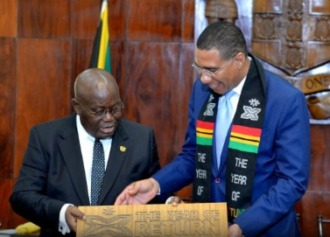The Government of Jamaica is seeking to renew its regional security agreements with Cuba, as both countries collaborate to combat drug trafficking and other transnational crimes affecting the region.
Minister of National Security Hon. Peter Bunting recently traveled to Cuba for an official three-day visit, where he met with top security officials to review and explore the renewal of the Jamaica-Cuba Maritime and Police Cooperation Agreements, which expired on Sept. 30.
Bunting was accompanied by Permanent Secretary in the Ministry Major General Stewart Saunders; Commissioner of Police Owen Ellington; and Head of the Jamaica Defense Force Coast Guard Commander David Chin Fong.
New agreements are currently being crafted by technical teams from both countries. After the teams have completed their work, Bunting is expected to sign the documents on behalf of the government of Jamaica.
During the visit, the Jamaican team held talks with Cuba’s minister of the interior, Army Corps General Abelardo Colomé Ibarra; head of police, Brigadier General Jesus Becerra Morciego; head of the coast guard, Brigadier General Lázaro Román; and Colonel Walkiria Fernandez, who heads the Canine Department.
Bunting told JIS News that the agreements aim to improve procedures and operative techniques resulting from a formal and structured relationship between the Jamaican and Cuban law enforcement entities.
During the visit, several areas for improvement and expansion of the agreements were discussed, including assistance in enhancing Jamaica’s canine capability in combating the illicit drug and arms trades.
Saunders said that the discussions with the Cuban security officials were “extremely useful and good for both countries”.
He told JIS News that the agreements are primarily aimed at strengthening bilateral and multilateral relationships between both countries, to ensure effective cross-border efforts in combating drug trafficking and other forms of organized crimes.
This increased information and intelligence flow, he said, allows law enforcement entities to recognize and make plans to combat emerging trends in organized crime, identify the leaders and the key elements of criminal organizations; and to identify potential weak points and informants.
“Transnational crime has no borders. You can’t secure your own borders unless you collaborate with other states in the Caribbean. You can’t be a stand alone, neither can Cuba or any other territory, so the more of these efforts and discussions we have to highlight our problems and see how best we can address them from a collective perspective… the better off we are,” the permanent secretary said.
As it relates to assistance in enhancing Jamaica’s canine capability, he said, “we looked at what better use we could make of detection dogs and dog handler training”.
He said that Cuba has specialist capabilities in the training of dogs, noting that “this is one area that Jamaica can gain a lot”.
“Cuba has a vast expertise in the training of dogs for the detection of weapons, drugs, cadavers, which is a critical need that we have here in Jamaica. Cuba has one of the most extensive dog-training facilities and so we need to avail ourselves of the opportunities,” Saunders said.
Other areas discussed include medical assistance, language training and exchange knowledge in best practices in maritime and policing domains, and trafficking in persons.
Source: Jamaica Information Service


